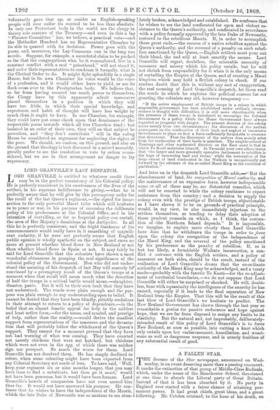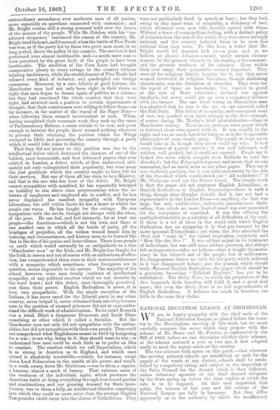A FALLEN STAR.
THE decease of the Star newspaper, announced on Wed- nesday, is an event deserving more than a passing comment. It marks the extinction of that group of Middle-Class Radicals,. which, under the name of the Manchester School, threatened at one time to absorb the Liberal party of Great Britain. Instead of that it has been absorbed by it. No party in England ever started with a fairer chance of attaining per- manent power. It had great chiefs, great ideas, and a great following. Mr. Cobden retained, to the hour of his death, an
extraordinary ascendancy over moderate men of all parties, more especially on questions connected with economics ; and Mr. Bright retains still a strong personal hold over the hearts of the masses of the people. While Mr. Cobden, with his " un- adorned eloquence," convinced the reason of the country, Mr. Bright fireditsheart, audit seemed, when the battle of Free Trade was won, as if the party led by these two great men must, in no long period, direct the policy of the country. The services it had performed were almost inestimable, and—a much rarer case— were perceived by the great body of the people to have been inestimable. The abolition of the Corn Laws had brought comparative plenty to every cottage in the country without injuring landowners, while the establishment of Free Trade had released every kind of industry, and quadrupled our foreign commerce. Moreover, by a rare felicity of good fortune, the Manchester men had not only been right in their views, so right that men began to dream again of politics as a science, but they had convinced the whole country that they were right, had attained such a position in certain departments of thought, that their countrymen were willing to follow them—as for instance, in the matter of the repeal of the Paper Duty— when following them seemed inconvenient or rash. When, having completed their economic work, they took up.the cause of Parliamentary Reform, a cause certain to be won, and great enough to interest the people, there seemed nothing whatever to prevent their attaining the position which the Whigs occupied in 1833, and governing the country through a party which it would take years to destroy.
That they did not attain to this position was due to the intellectual defect which destroyed the chances of one of the boldest, most honourable, and best informed papers that ever existed in London, a defect which, at first undetected, ulti- mately not only extinguished their popularity, but wore away the just gratitude which the country ought to have felt for their services. But one of them all has risen to be a Minister, and that is the one who has least of the defect. Mr. Bright cannot sympathize with mankind, he has repeatedly betrayed an inability to rise above class prepossessions when the in- terests of employers and employed are in conflict, and he has never displayed the smallest sympathy with European Liberalism, but still within limits he has a heart to which the people can warm. He has fought for the cottage. He can sympathize with the needs, though not always with the ideas, of the poor. He can feel, and feel intensely, for at least one people—the American—which is not his own, and there is one marked case in which all the bonds of party, all the bandages of prejudice, all the withes wound round him by training, and circumstances, and history seem to be burned like flax in the fire of his genius and benevolence. There is no people on earth which would naturally be so antipathetic to a true "Manchester man" as the Irish, and Mr. Bright has fought for the Irish in season and out of season with an enthusiasm of affec- tion, has comprehended them even in their unreasonablenesses with a sympathy which sometimes, when foreigners are in question, seems impossible to his nature. The majority of his school, however, were men totally destitute of intellectual sympathy, of any political emotion which we can describe by the word heart ; and this defect, once thoroughly perceived, cost them their power. English Radicalism is never, it is true, very sympathetic. With the single exception of the Italians, it has never cared for the Liberal party in any other country, never helped it, never refrained from sneering because men in the position of escaped prisoners did not at once under- stand the difficult work of administration. To its mind Kossuth was a rebel, Blind a dangerous Democrat, and Louis Blanc something or other which it called a Socialist. But the Manchester men not only did not sympathize with the nation- alities, but did not sympathize with their own people. They could not comprehend what Englishmen meant in 1854 by hungering for a war ; or see why, being in it, they should want to win ; or understand how men could be such fools as to prefer an idea to comfort. The emotion which we call Imperialism, which is as strong in America as in England, and which once stirred is absolutely irresistible,—which, for instance, swept down Lord Palmerston in the zenith of his power, and would, in a week, sweep down Mr. Gladstone,—was to them a caprice, a humour, almost a mark of lunacy. That extreme sense of the weakness of the individual, again, which produces the American habit of doing everything through iron-bound parties and combinations, and our growing demand for State inter- ference, was to them a folly, an intellectual blunder, something into which they could no more enter than the average English Ten-pounder could enter into the claims of Catholicism. They
were not particularly hard, in speech at least ; but they had, I owing to this inner want of sympathy, a deficiency of tact, which alienated even men who heartily agreed with them. Without a trace of cosmopolitan feeling, with a distinct policy of isolation from the rest of the world, they were never strongly national, and the country believed them to be even less national than they were. To this hour a belief that Mr. Bright would let America kick us—a pure, and, as we believe, an absurd delusion—would, under certain circum- stances, be the greatest obstacle to his leading a Government, and the greatest weakness of his ministry. Even within their own range their sympathies seemed imperfect. They were all for religious liberty, heartily for it, but they never seemed interested in religious liberalism, thought abolishing church-rates was the liberation of churches. They were for the repeal of taxes on knowledge, but wanted to growl at the cost of State education ; declared war against landlords, but never could get up oven a temporary alliance with the farmer. The one fiscal wrong no Manchester man has admitted that he sees is the tax on raw material called the Malt Duty. This defect of sympathy, and consequent want of tact, was marked even more strongly in the Star—except, of course, during Mr. Morley's brief administration—than in Manchester oratory. There never, perhaps, was a paper which so irritated those who agreed with it. It was usually in the right, and was as much hated for being so as is the disagreeable philosopher of some family party. The people at large never would take to it, though they never could say why. It had every chance of a great success ; it was well informed, well written, well pushed, but it could not succeed. People say it lacked the news which compels even Radicals to read the Standard; but the Telegraph is a power, and never, that we can remember, had as much news as any other paper. They say it was virulently partizan, but it was milk-and-watery by the side of the Standard, which would shriek out " All sophistries !" if Mr. Gladstone read out the Nicene Creed. The simple truth is that the paper did not represent English Liberalism, or English Radicalism, or English Democracy—there is such a thing, though since Douglas Jerrold died it has not had a representative in the London Press—or anything else that was large, but only middle-class, well-to-do, manufacturer Radi- calism, than which no more limited creed was ever presented for the acceptance of mankind. It was like offering the multiplication-table as a solution of all difficulties of the soul. If there is a set of ideas in the world with which English Radicalism has no sympathy, it is that put forward by the more ignorant Evangelicals ; yet when the Star absorbed the Dial, and " went in " for verbal inspiration, everybody said "How like the Star !" It was seldom unjust in its treatment of individuals, but was still more seldom generous, and always left an impression—false, we believe—that it fought the aristo- cracy in the interest not of the people, but of millowners. Its disappearance leaves no void, for the party which believed in it had disappeared before ; and the journal which should truly represent English Radicalism, the paper which should be a generous, far-seeing " Political Register," has yet to be established. The Daily News, to which the proprietors of the Star bequeath their function, will fulfil it, and a great deal more ; but even the Daily News is no full representative of English Radicalism. It believes too much in breeches, too little in the man they clothe.































 Previous page
Previous page